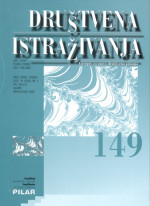Međukulturna kompetencija u suvremenom društvu i obrazovanju – empirijska studija u osnovnoj školi
Intercultural Competence in Modern Society and Education – Empirical Study in Compulsory Education
Author(s): Ana Šenjug KrležaSubject(s): Foreign languages learning, Culture and social structure , School education, State/Government and Education, Sociology of Culture
Published by: Institut društvenih znanosti Ivo Pilar
Keywords: compulsory education; intercultural competence; foreign language teaching; vignettes;
Summary/Abstract: The importance of intercultural competence has been recognized in educational systems of most countries in Europe as well as in Croatia. The development of this competence has been integrated into Croatian curricula in compulsory education for more than a decade. Although the development of intercultural competence has been primarily the task of foreign languages teaching, it is now becoming the goal of an increasing number of teaching subjects. This fact is particularly apparent in the current curricular reform. However, both social reality and previous research in this area indicate deficits when it comes to achieving goals set by educational documents. Therefore, an empirical study on a sample of 366 students was conducted with the aim of examining the development of intercultural competence within compulsory education. The method of vignettes was used to examine intercultural skills of elementary school students (grades 4–8). Among other things, poor integration of this competence in foreign language teaching was identified. Furthermore, there is no significant improvement in its development compared to previous research in this field.
Journal: Društvena istraživanja - Časopis za opća društvena pitanja
- Issue Year: 29/2020
- Issue No: 3
- Page Range: 471-492
- Page Count: 22
- Language: Croatian

